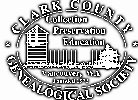
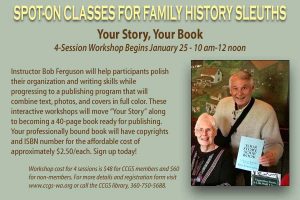
Graphic-YOUR STORY, YOUR BOOK
Thursdays: Jan 25, Feb 1 & 8-10-noon; Feb 15-12-2 pm
Beginning Thursday, January 25, there will be a four-week workshop session at CCGS called, Your Story, Your Book. Each two-hour weekly class will focus on a different topic. By the end of the fourth session students will have learned everything from the fundamentals of gathering and writing content, editing and proofing, formatting a book for publishing, and getting your book printed for approximately $2.50/each. Cost is $48 for members and $60 for non-members. Call to register at 360-750-5688.
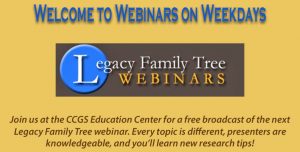
QUALITY, TIME AND COMPLETION: DEVELOPING A RESEARCH PLAN (PART ONE) WEBINAR
Wed, 10 Jan 2018: 5-6:30 pm
CCGS Education Center
This Legacy Family Tree webinar session will focus on the effort to balance time, quality and completion of a research project. The first segment will look at the process from research concept to logistics including the conflicting issues between the researcher and previous research. This will include the movement from basic data collection, evaluation and analysis to the development of a direction and specific actions.
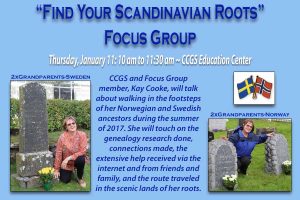
Graphic-“FIND YOUR SCANDINAVIAN ROOTS” FOCUS GROUP
Thu, 11 Jan 2018: 10:30 am to 12 pm
CCGS Education Center
Clark County Genealogical Society and Focus Group member, Kay Cooke, will talk about walking in the footsteps of her Norwegian and Swedish ancestors during the summer of 2017. She will touch on the genealogy research conducted, the extensive help received via the internet and from friends and family, and the route traveled in the scenic lands of her roots.
FULL CIRCLE: TRACING THE DESCENDANTS OF A SLAVEHOLDING ANCESTOR WEBINAR
Fri, 12 Jan 2018: 11 am to 12:30 pm
CCGS Education Center
Descendants of former slaveholders come from all walks of life. DNA and renewed interest in family history research continue to unearth this phenomena for thousands of people every day. In this Legacy Family Tree Webinar, learn how to confirm slaveholding ancestors and the tools needed to trace and identify living descendants of their formerly enslaved.
FINDING THOMAS’ FATHER: AN 18TH CENTURY PRINCE WILLIAM COUNTY, VIRGINIA CASE STUDY WEBINAR
Tues, 16 Jan 2018: 5-6:30 pm
CCGS Education Center
Thomas Stone left few records when he died in 1791 in Prince William County, Virginia. No document or reference names his parentage. Finding Thomas’s father took thirty years. Using indirect evidence and helped by technological advances, Thomas’s father has been found. Land records make the case. This Legacy Family Tree webinar demonstrates the process of creating a proof argument to identify Thomas’s father.
INTRODUCING THE GENI WORLD FAMILY TREE WEBINAR
Wed, 17 Jan 2018: 11 am – 12:30 pm
CCGS Education Center
Geni is the best platform for collaborative genealogy, which makes it absolutely the best place to build your family tree. In this Legacy Family Tree Webinar, you’ll learn how to take your genealogy to the next level using Geni’s unique tools.
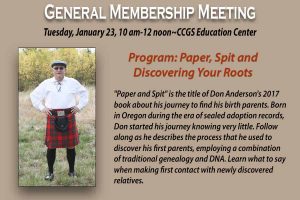
Graphic-GENEALOGY ENTHUSIASTS GENERAL MEMBERSHIP MEETING
Tue, Jan 23, 2017: 10 am to noon
CCGS Education Center
If you interested in genealogy, come to the Clark County Genealogical Society’s (CCGS) monthly membership meeting. The program is “Paper and Spit,” the title of Don Anderson’s 2017 book about his journey to find his birth parents. Born in Oregon during the era of sealed adoption records, Don started his journey knowing very little. Follow along as this engaging and energetic speaker describes the process that he used to discover his first parents, utilizing a combination of traditional genealogy and DNA. Learn what to say when making first contact with newly discovered relatives.
FINDING JAMESTOWN ANCESTORS WEBINAR
Wed, 24 Jan 2018: 11 am – 12:30 pm
CCGS Education Center
Explore numerous sources that can further genealogical research to help individuals identify a qualifying ancestor in order to join the Jamestown Society. This Legacy Family Tree Webinar covers planning research, finding source documents, helpful websites, business records, and common research pitfalls in genealogical research and how to avoid them.